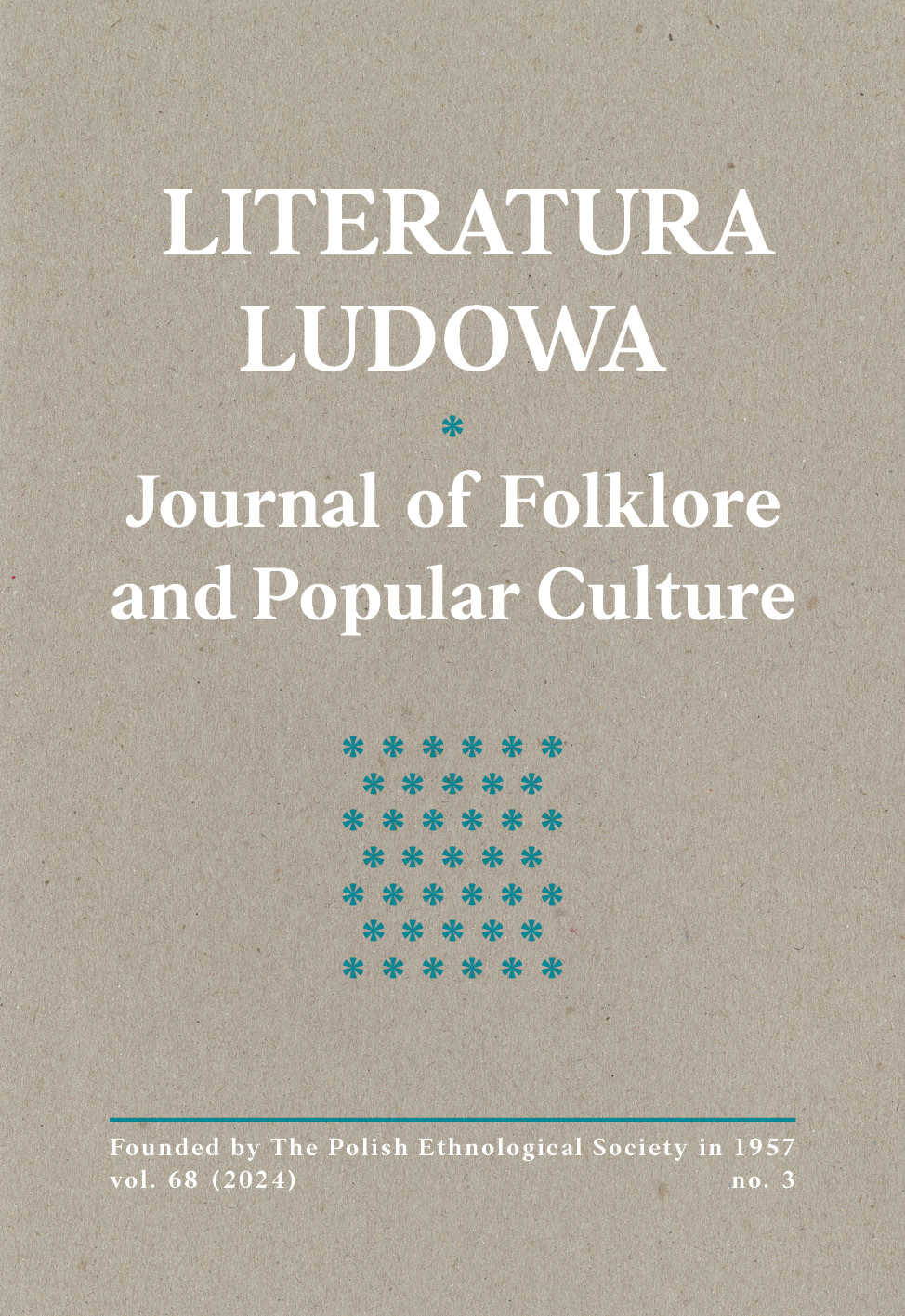An Analysis of Prohibitions Related to Coil Sewing and Weaving Works in South Wollo, Ethiopia
DOI:
https://doi.org/10.12775/LL.3.2024.002Ключові слова
weaving, prohibition, work, proverbsАнотація
The main purpose of this study is to examine the prohibitions related to coil sewing and weaving in South Wollo. The primary reasons for the study are its limitations in this regard, the existence of benefits, and practical problems. The type of study is qualitative, and the approach is ethnographic. The study found that while prohibition discourses are generally carried out with good intentions, they play both a negative and a positive role. Prohibitions play a major role in teaching and maintaining the existing customs of society. Psychologically, the study indicated that they have the role of protecting the speakers and society from threats, and fear. In terms of the economy, the fact that they hurt economic income by opposing the desire to change, the freedom of work, and choice are themes that are mentioned negatively. The study shows that the prohibitions are based on words, actions, contexts, and actual events, and their representation is mostly symbolic and logical. In a nutshell, it is suggested by the researcher that it is possible to create strategies that can be changed into positive ideas in a community-oriented manner and that continuous research should be conducted in this regard.
Посилання
Adugna, G. (2015). Gender Stereotypes in Amharic Proverbs. [Unpublished PhD dissertation]. Addis Ababa University.
Berhanu, M. (1986). An Analysis of Kambata Proverbs. [Unpublished MA thesis]. Addis Ababa University.
Bronner, S. (1986). Folk Objects. In E. Oring (ed.), Folk Groups and Folklore Genres: An Introduction (pp. 199–223). Utah State University.
Bronner, S. (1999). Material Folk Culture of Children. University Press of Colorado, Urban Institute.
Buszek, M. (2011). “Labor is My Medium”: Some Perspective(s) on Contemporary Craft. Archives of American Art Journal, 50(3/4), 66–75.
Das, A. K. (1979). Tribal Art and Craft. Agam.
Dorson, R. (ed.) (1972). Folklore and Folk Life: An Introduction. University of Chicago Press.
Ethiopian Bible Society (1962). Old and New Testament Books of the Bible. Light and Peace Publishing House.
Finnegan, R. H. (1970). Oral Literature in Africa. Clarendon Press.
Getu, T., Ȍmer, T., Recep, E., Yusuf, U. (2018). The Art of Hand Weaving Textiles and Creating on Socio-Cultural Values in Ethiopian (Review). International Journal of Advanced Multidisciplinary Research. 5(12), 59–67.
Hebbar, S. (2015). Exploring Basket Weaving Techniques for Space Making Elements through Computation Tools. [MA thesis]. CEPT University.
Leinhardt, G. (1990). Capturing Craft Knowledge in Teaching. Educational Researcher, 19(2), 18–25.
Melakneh, M. (2018). Cross-Cultural Wisdom in English and Amharic Proverbs. Ethiopian Journal of Languages and Literature, 14, 79–95.
Mieder, W. (1997). Proverb. In T. Green (ed.), Folklore: An Encyclopedia of Beliefs, Customs, Tales, Music, and Art (vol. 2, pp. 661–667). ABC-CLIO.
Molla, J. (2016). The Thought of Taboo in Libo Kemke District Community. [Unpublished PhD dissertation]. Addis Ababa University.
Moses, M. (2014). The Contribution of Indigenous Knowledge Use on the Livelihood of Rural Women in the Lowyeld Region of Swaziland: A Case Study of Handicrafts. [Unpublished MA thesis]. University of South Africa.
Motz, M. (1998). The Concept of Belief. The Journal of America, 11, 335–350.
Mullen, P. (1992). Listening to Old Voices. University of Illinois Press.
Osei-Poku, P., Osei, J. (2014). Production of on Loom Basketry Using Selected Local Material. International Journal of Fiber and Textile Research, 4(2), 12–19.
Prown, J. D. (1982). Mind in Matter: An Introduction to Material culture Theory and Method. Winterthur Portfolio, 17(1), 1–19.
Sellschop, S., Goldblatt, W., Hemp, D. (2005). Craft South Africa. Pan MacMillan.
Shanks, M., McGuire, R. (1996). The Craft of Archaeology. American Antiquity, 61(1), 75–88.
Silva, S. (2004). Basketry: Africa. In P. M. Peek, K. Yankah, African folklore: An encyclopedia (pp. 20–22). Routledge.
Teshome, S. (2015). Folklore: Mininteuna Yetinatu Yetikuret Akitacha. Solomon Teshome Baye.
Storey, J. (2012). Cultural Theory and Popular Culture. Routledge.
Taddesse, J. (2004). Guji-Oromo Proverbs: The Functional Context in Focus. [Unpublished PhD dissertation]. Addis Ababa University.
Teferi, G. (2000). A Study of Southern Agaw Proverbs. [Unpublished MA thesis]. Addis Ababa University.
Thompson, T. (2009). Getting ahead in Ethiopian: Amharic Proverbs about Wealth. Proverbium, 26, 367–386.
Timur, Ş. (2001). Reading Material Culture: An Analysis of Design as Cultural Form. [Unpublished PhD dissertation]. Bilkent University.
Waltenegus, M. (2014). Despising nature, honoring the flesh, an event that exposes the evil eye, the beliefnof the Gozam community in East Gojam. [Unpublished PhD dissertation]. Addis Ababa University.
Downloads
Опубліковано
Як цитувати
Номер
Розділ
Ліцензія

Ця робота ліцензується відповідно до Creative Commons Attribution-NoDerivatives 4.0 International License.
1. The authors give the publisher (Polish Ethnological Society) non-exclusive license to use the work in the following fields:a) recording of a Work / subject of a related copyright;
b) reproduction (multiplication) Work / subject of a related copyright in print and digital technique (ebook, audiobook);
c) marketing of units of reproduced Work / subject of a related copyright;
d) introduction of Work / object of related copyright to computer memory;
e) dissemination of the work in an electronic version in the formula of open access under the Creative Commons license (CC BY - ND 3.0).
2. The authors give the publisher the license free of charge.
3. The use of the work by publisher in the above mentioned aspects is not limited in time, quantitatively nor territorially.
Stats
Number of views and downloads: 281
Number of citations: 0



